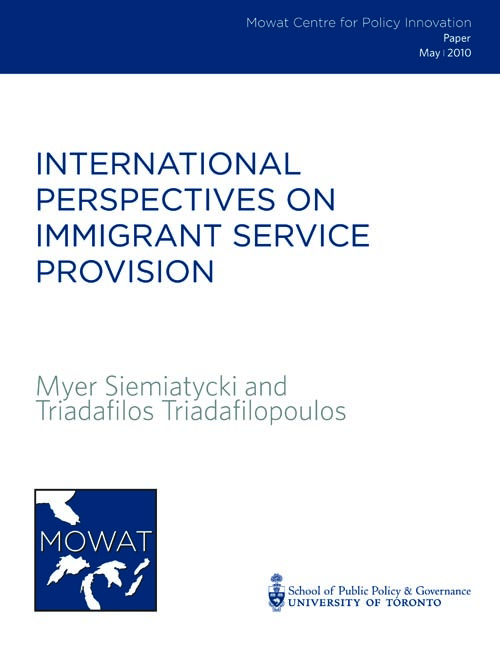May 28, 2010
In this paper, Myer Siemiatycki and Phil Triadafilopoulos examine the role of sub-national jurisdictions in immigrant settlement and integration in Australia, Germany, the United States and Britain. They find that Canada has been much more active, sophisticated and forward-looking in its immigrant settlement programs, but that some of these countries are catching up in important ways. There is broad recognition that sub-national jurisdictions can more quickly respond and successfully adapt settlement programs to meet local immigrant and community needs than national governments. As a result, they see a clear trend towards devolving these programs.
Executive Summary
The signing of the Canada-Ontario Immigration Agreement (COIA) in 2005 was a significant step forward in federal-provincial-municipal cooperation to support immigrants to Ontario and represents a significant achievement for both governments. The COIA is up for renewal in 2011 and an assessment of the first agreement provides guidance for a renewed and improved agreement.
The COIA differs from the agreements signed by the federal government with British Columbia and Manitoba, both of whom been given more autonomy by the federal government to run their own integration programs. The Agreement also differs from the one negotiated by Quebec, which grants Quebec full control not only of settlement services but of selection as well.
Ontario has never considered pursuing a Quebec-style agreement, given that such an agreement would significantly reduce the role of the federal government in nation-building through immigration, with the two largest provinces running their own immigration programs.
However, Mowat Centre research demonstrates that greater control over settlement and integration services, on par with the agreements that the federal government has negotiated with BC and Manitoba, is both feasible and desirable. The upcoming negotiations and renewal of the COIA provide an opportunity to pursue devolution of these programs to Ontario in order to expand and improve services to newcomers and help them integrate and prosper more quickly.
Continue reading
In a companion paper to the present report, Leslie Seidle (The Canada-Ontario Immigration Agreement: Assessment and Options for Renewal, May 2010) examines the Ontario, Manitoba and BC federal-provincial agreements and identifies a number of successes and potential improvements that should govern the renegotiation of the next COIA.
The achievements of the COIA include enhanced funding for settlement and integration services, expanded programming, co-funding of Ontario Bridge Training projects, increased professionalization of the settlement sector, and the successful inclusion of the municipal sector. Some new programs, such as the Local Immigration Partnerships Initiative, have been particularly successful.
Yet problems, such as a lack of follow through on federal spending commitments, have emerged that must be corrected in a renewed agreement. BC and Manitoba have not experienced these challenges. The federal government has delivered on its financial commitments. More importantly, from a program design perspective, these provinces have developed innovative services that are tailored to the particular circumstances of newcomers. They are also better coordinated with the suite of other provincial programs that support integration, in areas as diverse as sport and recreation, early childhood education, family counselling, housing, employment, community mental health, and all of the various services offered through the provincially-run education system that connect with children.
There are also lessons to learn internationally. In this paper, Myer Siemiatycki and Phil Triadafilopoulos examine the role of sub-national jurisdictions in immigrant settlement and integration in Australia, Germany, the United States and Britain. They find that Canada has been much more active, sophisticated and forward-looking in its immigrant settlement programs, but that some of these countries are catching up in important ways. There is broad recognition that sub-national jurisdictions can more quickly respond and successfully adapt settlement programs to meet local immigrant and community needs than national governments. As a result, they see a clear trend towards devolving these programs.








